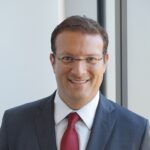Dr. Hughes likes the stable work environment and good benefits, such as retirement planning options, health insurance benefits and paid vacation time.
At the end of the day, the best position for a rheumatologist depends on what you want long term. “If you are entrepreneurial and are willing to take on additional work outside of your clinical practice, then private practice would be an attractive target,” Mr. Jennings says. “On the other hand, if you simply want to be employed and enjoy a busy practice with a competitive income, then you may want to consider a hospital-employed setting.”
Karen Appold is a medical writer in Pennsylvania.
Editor’s note: For another perspective, see “Advantages, Disadvantages of Private Practice Ownership for Rheumatologists.”
Advice from Peers
If you’re struggling with the decision of whether hospital employment or private practice is best for you, David Fernandez, MD, PhD, rheumatologist, Hospital for Special Surgery, New York, would advise asking other rheumatologists in both types of practice settings to share what they like and dislike about their current jobs. What aspects cause headaches? In what ways do they feel supported or burdened in their current position? “The more honest, unvarnished opinions you hear, the clearer your decision will be,” he says.
If you think you might like working in an academic setting, Lisa Criscione-Schreiber, MD, MEd, associate professor of medicine and rheumatology training program director, Duke University, Durham, N.C., suggests going for it. “You might be led in directions you’ve never considered,” she says. “It seems to be more difficult to go from private practice to academics than vice versa, and you can’t go wrong starting off in an academic setting with enhanced clinical mentoring and built-in opportunities for continuing education.”
If you are interested in research, Matthew Stoll, MD, PhD, MSCS, associate professor in pediatric rheumatology, University of Alabama at Birmingham, Children’s of Alabama, Birmingham, Ala., recommends choosing an academic setting because most research would be difficult to do in a private practice setting. “If you start out in private practice and then decide that you want to do research, it’s going to be hard to find the time to do that,” he says.



